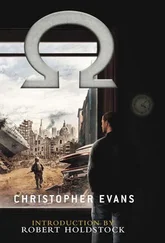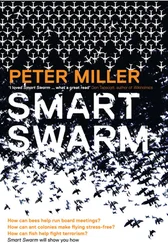“The military implications are just the beginning,” she went on. “The first Internet revolution connected immobile computers. The second one, mobile devices like phones. Now we’re on the cusp of the third. Networked self-propelled devices. They’re going to change everything, not just wars. Economies. Societies. Everyone’s lives.”
“And you say the US military has nothing to stop this kind of drone attack, nothing comparable,” Anya said, still sounding incredulous.
“It’s not like they confided all their secrets in me. But as far as I can tell, they’re always trying to fight the last war over again and get it right this time. Right now their planning is all about urban insurgencies. Drone war wouldn’t even be war as they understand it. No fronts, no territory, not even any soldiers. Just a handful of launch sites and a few people sitting at laptops, orchestrating the network.”
“And a few factories beforehand.” I was trying to think aloud of reasons why she couldn’t be right. “That’s what I want to know. We know about the software. What about the hardware? Where are these things physically coming from?”
“Taiwan,” Jesse suggested. “Malaysia. Germany. California. China. A bunch of companies that take the designs, churn out the parts, and don’t know or care what they’re for as long as the money’s good. Ain’t globalization a bitch?”
I smiled sourly.
“It’s not just my software,” Sophie said unexpectedly. “My work is the foundation, but I spent a couple days analyzing that drone we found in Colombia. I think whoever built it actually evolved its neural net, expanded its capabilities. Which means they’ve got some very smart people working for them.”
We absorbed that news in silence for a moment.
“Well, that’s just great,” I muttered. “Like things weren’t bad enough already. But the question is, what do we do now?”
“I think we should call the US embassy,” Sophie said. “They can get us passports, guarantee our security.”
I became aware of an odd sound in the distance, tickling at the very edge of my hearing.
“That will be a good trick, considering that you are the only American here,” Anya pointed out.
Sophie smiled at Anya. “These days you’re whatever your passport says you are. I’m sure they’ll give you temporary ID to get you out of here and back to the USA.”
“Where Jesse and I will promptly be arrested.” Anya said tartly. “No, thank you. We will be safer with my uncle than your embassy.”
I suddenly remembered where I had heard her uncle’s name before. “Holy shit. Viktor Kharlamov. The dissident billionaire. The one who lives in London. The one the Russians tried to assassinate. That’s your uncle?”
“That’s him,” Anya agreed. “Uncle Viktor.”
I looked at Sophie, stunned, and expecting the same from her; but she took it in stride. Or maybe she had already known.
That strange, tantalizingly familiar sound was growing louder, and warping slightly. Not in the shantytown, but above it, incoming -
“Holy shit.” The awful realization hit me. “A drone, that’s a drone, they must have tracked Zavier’s phone from when we called from the hotel.”
I leapt to my feet but I knew it was already too late. The motor’s whine was too loud. It was no more than a few hundred feet away, and coming fast.
I emerged from the hut just in time to see the enemy drone soar past, fifty feet overhead. Around me the shantytown’s denizens emerged from their hovels and stared up in wonder as the drone began to circle. I wanted to warn them away, but held my tongue: if it had been sent to divebomb Zavier’s phone and explode, we would already have been reduced to bloody smears. It was on a recon mission, not kamikaze.
Anya appeared beside me, followed shortly by Jesse and Sophie. We all craned our necks as the UAV flew tight circles above us.
“I don’t mean to sound ungrateful,” Jesse said, “but why aren’t we dead?”
“Maybe it isn’t armed,” Anya suggested.
I shook my head. “Haiti’s their major transshipment point. I’m sure they have bombs here. We’re alive because they want at least one of us alive. Come on. There’s a camera and a radio on that thing, we have to lose it.”
“How?”
“Zavier!” I called. “We have to go. Il faut qu’on sort immediatement. Et laisse ton telephone ici! ”
The drone followed us to the Toyota, and stayed with us as we remerged into Port-au-Prince’s maddeningly slow midday traffic. We headed downtown. When I stuck my head out of the window and looked up I saw it flying in lazy circles. All around us people pointed and stared at the mysterious skyborne interloper.
I wondered if its onboard neural net could track our vehicle, or if someone was guiding it manually. I wondered how far away the enemy’s ground troops were. Our drones could fly for six hours; circling ate up more power than cruising, but we couldn’t count on outlasting the thing above us, especially as it was built of carbon fibre, strong as steel but as light as the bones of a bird. We had to somehow lose it.
“Zavier,” I said, “Are there any road tunnels in Port-au-Prince?” I tried to think of the French for ‘tunnel’ and failed. “Underground!” I motioned with my hand.
He looked at me as if I were crazy. Then a light went on in his eyes, and he smiled conspiratorially, and confided: “ J’ai une idee .”
Zavier leaned on his horn, stomped on his accelerator, and swerved the Toyota directly into oncoming traffic. I gasped, Sophie grabbed my arm, all Zavier’s passengers thought we were going to die right there, but the oncoming taptap veered into the middle of the road as we caught the asphalt’s outside edge. I glimpsed its driver’s face as we passed. He didn’t seem even slightly fazed.
Zavier directed us up a steep side road I wouldn’t even have noticed, between two high stone walls half-overgrown with vines. There were tall trees behind both walls. For a moment I hoped that the drone might get caught in them, but it climbed and stayed above us as we rattled up the vertiginous cobblestoned street. The Toyota vibrated so violently that I couldn’t even speak. We crested the hill and descended past more walls, these ones topped with barbed wire and shards of broken glass, until suddenly they ended and we were back amid mud and tin huts; a long, narrow shantytown that followed the path of a power corridor.
The huge electrical towers that stood two by two looked like frameworks for massive human figures, motionless and stoic, bearing the wires draped over their shoulders and knees for the good of the city. They were not well-maintained: I could hear the crackling buzz of arcing electricity, could practically feel their hum. The shantytowns ran right up to the base of the power towers. It was a fantastically dangerous place to live, and in other circumstances the sight would have been harrowing – but just then I could not have been more delighted.
I stuck my head out of the window in time to see the drone falter and wobble as the rogue electromagnetic fields drove its circuitry and communications haywire. Then it gave up the struggle and fell, lifeless. A wingtip hit a power cable and it cartwheeled through the sky, banged into a tower, fell like a stone to the mud beneath, and lay crumpled and dead.
“Zavier,” I said, “you’re a genius.”
He smiled modestly. I noticed that top of the drone was painted with green camouflage patterns, like soldiers’ jungle uniforms, except for the two darkly gleaming solar panels.
“I’d like to take a look at it,” Sophie said.
“No!” Anya objected. “We don’t have time. They know where we are.”
Читать дальше












